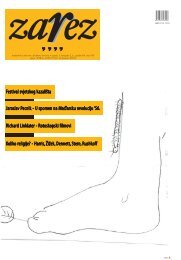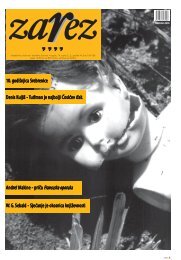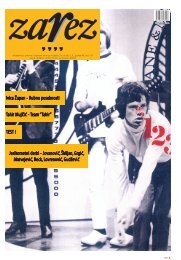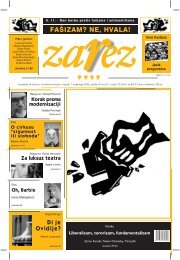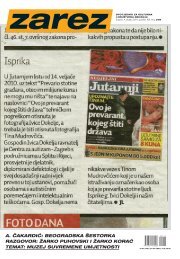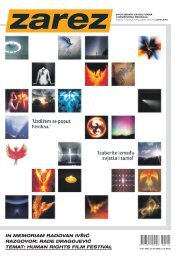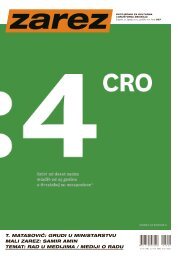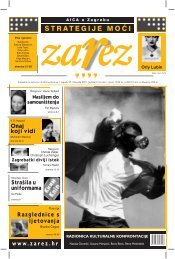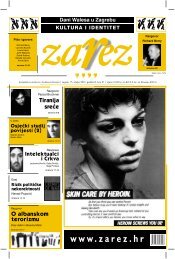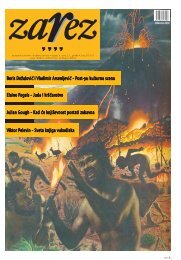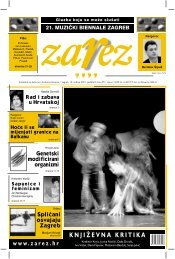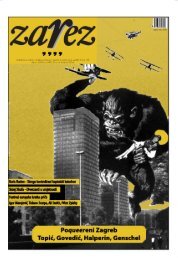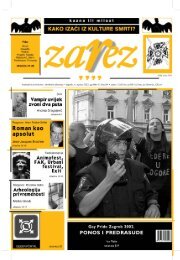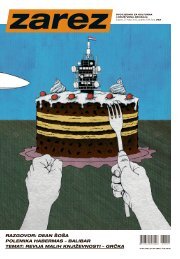18 II/40, 12. listopada 2,,,.n her influential work Poeticsof Postmodernism, LindaHutcheon retraces MichaelAsher's extraordinary spatial intervention:in 1973, he sandblastedthe wall of Toselli Gallery in Milanin order to "reveal" the plaster beneathas his work of art. His interventioncalled into question notonly the status of the "work of a-rt", but also the status of "gallery";it breathed new life into the debateon the relationship between creationand destruction, artistic conventions,the concept of "fringe"and the possibilities of goingbeyond the boundary of the fringe.What made me think of radicalism,literalness and obviousnessof Asher's "action" were the creativestrategies of the youngest <strong>Croatian</strong>poets, by which I mean the generationthat emerged during thenineties. Like that blast of sand,their books critically reve-aled majorexperiences of <strong>Croatian</strong> poetryduring the last few decades and focusedour attention to narcissisticisolation of literary subject. They"copied" everyday scenes with onlyslight stylization, as they copiedintertextual and intermedial gestuality,mimicries of the genre,fragmentation and colloquizationof lyrical idiom: these are the pointsof reference for "new poetry"...Unlike the previous generations,the nineties poets lacked a forumthat would help promote theirwork. They published in randompublications like magazines or anthologies(magazines Godine, Zor,Libra, Rijek, Aleph, Homo Volans...)or Quorum (the cult magazineof the eighties, still favoring theconspiratorial ferocity of the youngestpoets). More important poetsto a<strong>pp</strong>ear during the last decadeare: Tvrtko Vukoviæ, Katarina Ma-uran, Ivan Herceg, Alen Galoviæ,Damir Radiæ, Tatjana Gromaèa,Ivica Prtenjaèa, Dragan Jurak,Zvjezdana Bubnjar, Krešimir Pintariæ,Srðan Sacher, Katarina-ZrinkaMatijeviæ, Robert Perišiæ, MilanaVukoviæ, Kemal Mujèiæ-Artnam,Radenko Vadanjel, LucijaStamaæ, Tomislav Bogdan, SanjinSorel, Stjepan Balent, Ana Brnardiæ,Dorta Jagiæ, Lana Derkaè andothers.The <strong>Croatian</strong> setting in the ninetiesdid not really lend itself topoetry. The first half of the decadewas marked by war, the secondone by the profound national crisis.The catastrophic reality hascompletely wiped out the valuesthat were already eroded even beforethe war, simultaneously abolishingthe possibility of formingany evaluative hierarchy. Someonemight think that war triggered theemergence of a new value system,Poetic Generationof the NinetiesIndifferent subject, nonmetaphorical("journalistic")poetic style anddiscoursive pattern ofprose poem: these are thebasic characteristics oflyrical discourses in theworks of the most of ouryoung poetsKrešimir Bagiæbut that is not the case. Postmodernindifference is so deeply rootedin our environment (at least in theworks of the youngest generation),that it managed to overpowereven the factual apocalypseof war. The poets who started publishingduring the war mostly donot thematize the war (or if theydo, they do so very subtly, peripherallyand an passant); they refrainfrom lyrical projects that implyany involvement or action;they are preoccupied with intimacy,composing their poems by randomsuccession of concrete detailsand sentences that surround them.Their motto is "knock, and it shallnot be opened unto you." To illustratethe typical sensibility andcreative methods of the nineties, Ihave chosen the poem WeekendNo. 31 by Tvrtko Vukoviæ. Let memake things absolutely clear: in selectingVukoviæ's poem I was nottrying to single out the best text ofthe period, but simply the one thatfunctions as a symptom of the prevailingpoetic condition.WEEKEND No. 31Ivan is dead. Cecilia has a dog. Hisname is Lucky.Marina has undergone surgery: tumorof the uterus.Granny makes tomato soup. I hatetomato soup.For days, I eat only eggs. No meat. Ilove toeat meat. On weekends, there is noelectricity.Electricity is expensive. Life ischeap. Neighborsare fat and boring. The city lies inruins. Ourhouse still stands. Bars are empty.Police hourstarts at eleven. Zagreb is attractive.The trainleaves at three o'clock. My belongingsare packed.I leave. Neda will be waiting forme. Neda isbeautiful. I am content.(from the bookShrugging Your Shoulders)By accumulating "information"about himself and his immediatesurroundings, Vukoviæ's subject infact insists on dispersion of hisconsciousness. Lyrically, this dispersionmay act suggestively onlyafter the semantic value of "information"from the text has beenabolished. Through the successionof simple sentences, their relativecorrespondence and the absolutedenial of metaphorical speech, thelyrical subject expresses and establisheshis disinterest in the space ofreality and the space of imagination.Thus, his final statement (Iam content) could be understoodboth as a means by which the outsiderbecomes literally consciousof his position, and as a self-ironicexpression. In both cases, lyricalspeech has therapeutic function,because we are talking about thesubject who consented to his exileand who is in danger of disa<strong>pp</strong>earancefor that very reason. Indifferentsubject, non-metaphorical("journalistic") poetic style and thediscoursive pattern of prose poem:these are the basic characteristicsof lyrical discourses in works ofthe most of our young poets. Asstatements correlative to Vukoviæ'spseudo-punchline (I am content), Irandomly quote verses of his poeticpeers:- Actually, nothing is ha<strong>pp</strong>ening(by Alen Galoviæ, poem The GirlWho Sows Wheat from the bookLittle Body of Morning)- It’s best if we talk about theweather (by Ivan Herceg, fromOur Other Names)- This life suits me (by TatjanaGromaèa, poem Latrine in the Hills,from the book Is SomethingWrong?)- I'm fine, in fact --- no big dealeverything's fine anyway (by Katarina-ZrinkaMatijeviæ, from thebook I'm Fine, In Fact)Colloquialisation of thelyrical idiomPoets from the seventies andeighties mystified and variouslychallenged the (almost sanctified)position of an outsider. They fearfullyshut themselves off from realityinto the realm of literature oralternative culture. But poets fromthe nineties are equally indifferentto everything (even the realms ofculture and literature). And this, asfar as I can see, is their diferentiaspecifica. If indifference (no matterhow phony) is understood as majorcharacteristic of a lyrical subject,than improvisation and non-figurativepoetic speech stand aschief characteristic of poetic techniquesin the nineties.In Tatjana Gromaèa and her recentlypublished first book of lyricscalled Is Something Wrong, wegained a master of lyrical hyperbolizationof the present tense, accidentaldetails and unexceptionalsituations. This author synthesizes,to a certain degree, her generation’seffort to colloquialize poeticdiscourse, since she advocates those"factual" verses and dethroningof forms known for their lyricalmonumentality. Thematic referencesof her poetry are, for instance,a family quarrel, going to a hairdresser,conversation of two womenin the tram, guys who shovelsnow, workers playing cards in thetrain etc. What makes her variantof "factual poetry" attractive is itsseductive narrativity, ingenuity ofthematization and an outstandingcommunicative force of the text.She insists on little stories in verse,with skillfully chosen expressiveand factual perspectives, and sheexcels at dialogue and effectiveemphasis. Gromaèa's model couldbe illustrated with the next poemof hers:Fucked-up GirlShe leaves in the morning, comesback just before the evening news.Western working hours.Long black coat, gray reality on herface.Hair tucked behind the ears.Her mailbox empty,except for the pizza ads (free delivery)and bills for heat and water.She unlocks the door, throws thingson the floor.She washes her face, and while dryingit with a fluffy towelwatches her face in the mirror.She slips on some old worn-out tracksuitand sits in front of the TV.Warms up yesterday’s meal.Looks through a window, brushesher teeth.And finally, goes to sleep.The subject of Gromaèa's poetryclearly shows that in life - as o<strong>pp</strong>osedto grammar - there are morethan three persons to consider;moreover, under the first personsingular,countlessworlds mighthide. Gromaèa'ssubjectsimultaneouslycriticallyre-evaluatesthe mimesisof everydaylife andself-criticallyquestions itsexperiences.Its dispersionis signalized,among otherthings, byfrequentchanges ofthe speaker'sgender frommale to femaleor by playfulinterconnectingof highand lowmotives andcategories.This subjectdedramatizesreality andhis/her positionin it byexchangingprevious"expressive spasms" with expressiveease. As we might expect, thisimmediate experience is accompaniedby a<strong>pp</strong>ropriate speech idiom.Expressions like "honest to the hilt","existential comma" or "fuckedup girl" clearly point to the relaxedjargon of the contemporary loser.Although in some poems Gromaèatheatralizes the lyrical subject,we can’t help rejoicing in the factthat the poet challenges the typicaland often employed duo of "indifferencecum sense of powerlessness".Besides Vukoviæ and Gromaèa(whose writing styles are diametricallyo<strong>pp</strong>osed - he writes in exclusivistic,she in journalistic style),the colloquialization of lyricalidiom and the mystification of theconcrete, present and momentaryperception - these characteristicsare eagerly explored in the worksof Ivan Herceg, Dorta Jagiæ, AlenGaloviæ, Katarina Mauran etc.Narcissistic isolation<strong>Contemporary</strong> writers, includingthe <strong>Croatian</strong> poets under discussion,are condemned to bothnonliteral reiterations and searchfor authenticity in spite of theirawareness of how inauthentic theirevery experience and thought is.Various authorities warn us that itis exactly repetition that "authentically"marks our times. If someoneforced us to characterize the currentstate of affairs, I would say welive "after the orgies", said JeanBaudrillard, influential thinker andone of the ideologues of postmodernism.Baudrillard adds: Orgiesare explosive moment of modernity,they liberate modernity on everylevel. Today anything goes, thegames are already played out andwe are collectively faced with thequestion: but what after the orgies?It seems to me that the answerof the youngest <strong>Croatian</strong>writers to this question amountsto narcissistic isolation of the subjecton the one hand, and intertextualand intermedial revival ofthe old games on the other. Narcissisticisolation comes as a consequenceof subject's persistent focusingon the details and scenesthat immediately surround him/-/her. Isolation is used for self-analysisand therapy in the strict sense.This is most readily a<strong>pp</strong>arent inthe writings of Ivica Prtenjaèa, LanaDerkaè and Radenko Vadanjela.With the title of his first poetrybook, Writing Liberates, Prtenjaèaactualizes the ancient idea aboutbeneficial effects of poetry and thesymbolic healing and mental healthacquired through escape intopoetry. His impromptu lyrical therapyis performed in two stages:first the subject polemically facesthe surrounding world and declareshis nonconformity, then hetries to capitalize on his precious"autism". His polemical blade cutsmost deeply where the consumeristsociety and its status symbolsare concerned. We are repeatedlyreminded that all the real values intoday's world are lost, and that thisworld is primarily characterized byits artificiality. The dazzle of neonads, sacralization of money, silicones,street lights, screens: this, accordingto Prtenjaèa, is the inventoryof the amusement park we livein. Since he opted for loneliness,his lyrical subject insists on thedistinction of artificial/natural. Iquote Prtenjaèa's Silicone from thebook Writing Liberates:on Sunday whenF they turn off theblue neon lightand cool off the pipes full of lonelygasyes solitude is perfectif made of natural materialsJuxtaposing various discoursivematrices, Prtenjaèa analyzes andironizes ideas and concepts behindthem. The syntagm and the sentenceare the most frequently usedPrtenjaèa's frames through whichhe achieves his "power of speech".One might say that his poetic stylefollows the trace of Šalamun's orMaleš's euphoric associative linksand playfulness (especially in verseslike "the island has no children/he is someone’s dive into the co<strong>pp</strong>ersummer/ blue yachts dock there/yachts brimming with Odysseuses//").Prtenjaèa’s poetic worldsare immediate, extravagant andexclusive forms of self-oblivionpracticed by a being immersed inlanguage.Prtenjaèa also takes into accou-
II/40, 12. listopada,,,. 19nt that orgies that preceded himhad other revelers, which meansthat his proclaimed therapy bypoetry (also emphasized by thebook title) springs from the experiencesand writings of his predecessors.Language games he employs"copy" already establisheddisunities in canonical speeches;they cause the emergence of thenew order with global characteristicsof openness, fragmentarinessand plurality. This order is in factheterogeneous, like the discourselaunched during the seventies andeighties (by Makoviæ, Maleš, Èegec,Rešicki...). And yet, thanks tohis conscious use of inauthenticity,Prtenjaèa succeeds in making hiswriting really therapeutic: he findsthe point where "to copy" translates"to set free"!Lana Derkaè, on the other hand,insists on penetrating the realmof the invisible, doubtful andunclear, in order to achieve greaterawareness of her own identity andexistential experience. She has foundher space in the metaphor ofthe forest. Epithets she chooseswhile turning the forest into thesymbol of lyrical habitat are "darkness"and "enshrinement". Sheexclaims, with pronounced intimateand inspiring note of verballyestablished relationship: The forestis my/ Extended bed (poemEmbroidery, from Poor Box forShadows). With these verses, LanaDerkaè creatively shows that forestcan be a center of the intimateself, just like the house, cave orcathedral. In words of Gilbert Durand,"the enclosed space of the forestmakes it a sacred place." InDerkaè's poetry, the world outsidethe forest looks utterly compartmentalized,the space where onlythe frustrating repetition of the sameis possible. This outside worldis the world of office binders, administrativeforms and warranties(we can easily compare it with Prtenjaèa'samusement park), and its“administrative orderliness” doesn’textend just into the material,but also into the spiritual sphere ofthe world. The precondition for atrue subject to emerge and gainexperience is its departure fromthe outside world. The forest metaphoris in fact a metaphor of isolationand the signal of imaginaryrenewal of the landscape; signal ofreturn to the original homeland.The consecrated state of creativityin the lyrical forest is the state ofsilence. Derkaè: Instead of me, theforest knows:/ Silence is a capital.//Radenko Vadanjel, on the otherhand, is preoccupied with details,small shifts, subtle traces... Hispoetic hero is a hypersensitive observerwho feeds upon images hecommitted to memory and eventuallyblends with the scenes observed.Although majority of hisfabulations are melancholic, everyonce in a while he writes with a criticaledge and ironizes banality,things we take for granted, intellectualand emotional limitations.Intertextual gestualityExceptional closeness and thepotential substitution of categoriesof "power" and "powerlessness"is best witnessed by poet's relationshipto his/her textual heritage.It might seem like s/he has onlyother people's words, sentences,techniques and stylistic figures underher/his disposal, but we mayalso claim that poet subjugates thisvery heritage to his own humoristor ironic reinterpretation. Lyricalsubject in this respect looks like atourist that touches only upon thesurface of things, not really "participating"in the world he thematizes.Already quoted TvrtkoVukoviæ puts intertextual gestusinto question with almost theoreticalprecision in the poem Encyclopediaof Despair.Encyclopedia of DespairEverything I writeis just a half-assed cry in the era ofsilencea doctored compass for a fast,precisely directeddeparture toward what's alreadybeen spent...... I copy, I shamelessly copywords, whole sentences, and they,as if in the street, as if in literature,offer themselves to this present tensein which the despair is brutally condenseddespair about which I could writean Encyclopediaif it did not exist already:Encyclopedia of the Dead, EncyclopediaofNothingness, <strong>Croatian</strong> Institute ofLexicographyEncyclopedia, Encyclopedia of Sport,Encyclopedia of Houseplants...The title of this poem is also itscommentary, a detection of thesubject's condition, but also thedetection of global condition, inface of which the subject feels helpless.All the world is "encyclopedized","finished" in a sense. Again,may I add, the reader is faced withthe frame of mind of Prtenjaèa'samusement park of administrativecatalogues of Lana Derkaè. Whateverwe think of doing - someonehas already done it: that is whyVukoviæ cites Danilo Kiš's andStanko Andriæ's book titles, i.e. afew non-fiction lexicographicalworks. Vukoviæ unambiguouslyrealizes nonliteral copying as theonly possible mode of creation.Different variants of intertextualitya<strong>pp</strong>ear in works by Sanjin Sorel,Krešimir Pintariæ, Tomislav Bogdanetc. But let us now concentrateon another feature.Intermedial gestualitySome poets from the ninetiesfocused their creative strategies onthe goal of somehow "globalizing"lyrical speech. Globalization meantopening of the text toward thepopular culture and media experiences,and reducing the languageof the poem to merely communicative"means" (until recently, thisstrategy was unthinkable). But intermediality,of course, is not a noveltyin <strong>Croatian</strong> poetry. On thecontrary, it is a desirable methodthat has been re-canonized by thelyrical techniques of the eighties;thanks to the influences of rockmusic, video, film and comic strips.However, the nineties havebrought with them a radical intermediarywidening of the empiricalfield. Although in recent years somemusicians, like Srðan Sacherand Lidija Bajuk Pecotiæ, decidedto print their songs as poems (andthereby literally unite differentmedia), the direction and the meaningof media transgressions ismost obvious and most extravagantin writings of Dragan Jurak,Damir Radiæ and Robert Perišiæ.They reached out for almost paradoxicalmedia correspondences,since their lyrical protagonists walkthe prairies of the Wild West andthematize relationships betweenIndians and cowboys. They reach,of course, for the genre stereotypesof western movies, directlylinking poetry with film. Goodexample of how cowboys acclimatedthemselves to <strong>Croatian</strong> poetryis Jurak's book Horses and Riders,from which I quote:Marlon at the MoviesHe a<strong>pp</strong>earsin sheriff's uniform.he drinks coffee by the gallontalks with difficultywalks with an effort.a docile woman watches himwith tears in her eyes.half of the citywatches himwith tears in their eyes.the other half(rednecks)fear for their wives.The poetry and film blend inthe title and beyond - lyrical subjectsits in the movies, in front of thegiant screen, obviously watchingMarlon Brando in the leading role.The poet playfully connects eventson the movie screen and in frontof him, deliberately mixing perspectivesand abolishing the boundariesbetween artificial world ofthe movie and the reality of itsconsumer. A cursory glance revealsthe cinematic composition ofthe text: Jurak presents film narrationstri<strong>pp</strong>ed of its usual lyricalexpectations - what we follow arein fact shots from the movies andold cliches of creating movie suspense.Damir Radiæ goes a step further.Almost all commentators ofhis poetry point out that its cinematicquality is crucial for understandingthis poet. For instance,Quorum critic Delimir Rešickidescribed Radiæ's book Lynx Huntingas the synthesis of "techniquesof transmediary and transtextualpalimpsests with typical westerncut ups", and young Sven Cvekwrote: "in the era when the onlyreality is media reality and whenrestrospectiveness (in the form ofre-vivals, re-cycles and a wholebunch of other re-phenomena)stands as a dominant cultural trend...retrospective becomes theonly possible perspective." Indeed,Radiæ's poetry is filled with allusions,expressive and structuralcliches, nostalgic or ironic revivalsof canonized artistic techniques.His thematical world is entirely artificial:everything in it is secondhand,and a literal communicationwith the text is probably the leastwelcome a<strong>pp</strong>roach. In my opinion,Radiæ's lyrical concept is best illustratedby the long poem The DeludedSheriff. It is basically a Westernscreenplay in verse in which wefollow a very interesting plotabout the virtuous sheriff whounwaveringly fought for justiceand who obeyed the highest moralprinciples. Skillfully "shooting"scenes of this lyrical story, Radiæprovides the text with stereotypicalportraits of heroes and theirenemies, together with the functionaldescription of duel, the landterritory, horses, shepherds,stage coaches... Lyrical speech becomesthe speech of "sheer facts." Iquote an illustrative introductionto a gun duel:He a<strong>pp</strong>roached the horse and undidthe reins, preparing to mount."Just a moment, man", he heardRingloke from the shadows.Chat Salvador sto<strong>pp</strong>ed, his back stillturned to Ringloke.He did not move for a while, justlowered his head.He acts like a man who expects theblow of disaster andbelieves that he knows all too wellthat disaster is inevitable.Ringloke comes three or four feetcloseruntil he too is exposed to sun raysthat shine through windows anddoorsand paint the dust road with goldencolors."Turn around and fight", says Ringloke.I believe the quoted passage illustratesquite well Radiæ's deliberatemimesis of western moviegenre. However, when the text isobserved more carefully and in full,it becomes obvious that author'slyrical organization arises muchmore from the need to loosen upthe canons of both lyrical poetryand westerns, than from the "nature"of author's speech. To tell thetruth, Radiæ, similarly to Jurak,does narrate about cowboys andIndians, but they are here only becausethe author is searching forindirect way to present his story.Film stereotypes are used as acceptableframe for lyrical mystificationand globalization of a differentexperience. By the same token,Radiæ cheats the reader by offeringa genre story as a poem, which furthertransfers the lyrical discourseto the journalistic level and introducesthe reader to a new mediagame. The fetishistic experience ofornamented poetic language isconfronted with the bare sentence,depoetized phrase, narration andrhythm of everyday narration.Thus the retrospective becomes aprivileged perspective. Neverthe-The creativestrategies ofyoung <strong>Croatian</strong>poets remind meof the radicalism,literalness andobviousness ofAsher’s "action"in Milanless, it continues to be a very subversivestrategy, since it relativizesclassical patterns of perceptionand puts into question the usualunderstanding of the analyticalterms like "subject", "individualstyle", "genre", "art work". Gestualityof Jurak's, Radiæ's and Perišiæ'swriting is based equally on the motivesfrom popular and high culture,and it is not possible (at leastnot without considerable violence)to reduce them to one or the other.Although the high/popular ambivalencehas been present in<strong>Croatian</strong> literature from the earlyeighties, their variants of the "global”poem are its most radicalexpression so far.The described creative strategyis completely in sync with the prevailingspirit of the era. We can findthe confirmation of our thesisin a recent statement of Fredric Jameson.This distinguished theoristproclaimed that something obviouslyha<strong>pp</strong>ened with literature,since it has become hard to acknowledgethe existence of the socalled "high literature". "In fact, Ithink that the books that are importanttoday... are the books permeatedwith popular culture; thebooks that do not try to create separatespace for high literature.",concluded Jameson, observingthat today, contrary to modernism,when works of art had an immanentvalue (as a creation of anindividual person), "we are havinghuge difficulties in finding individualisticworks of art." Maybe Jamesonis right, but then again,maybe the elements of individualcreation do still exist, only on other,more subtle textual levels.Poetic language turns journalisticand other sins of literacyFinally, what I consider the mostinnovative in the poetry of thenineties is the desacralization ofpoetic language. In significantnumber of new works we findjournalistic idioms which evidentlytestify to the fact that languagehas ceased to be a consecrated spaceof gaining experience, experimentationand imaginary worldmakings,turning instead into amere vehicle for relaying messages.Many have neglected the classicalattitude that "it is almost impossiblenot to characterize personalexperience or not to sell offwhat we felt and lived through ifwe persist in the regular forms ofcommunication" (Peter Sloterdijk).If <strong>Croatian</strong> poetry continueson its present course, I expect substantialchanges of its literary senseand status. It is indicative thatnegligence towards language is reflectedalso as the negligence of elementaryliteracy. Tatjana Gromaèa,for example, for no a<strong>pp</strong>arent artisticreasons or stylistic effects, insistson constructions with doublenegation: "kids are playing hideand seek/ nor do they not noticethe fellow with the gun in his pantswalking behind me" or "there aremany funerals/ they are not nothingspecial". It would be, of course,more correct to say that kids "donot notice" the uncle and that thefunerals are "nothing special". Sheeven misuses congruencies, like inthe sentence "let me undress thisthree pairs of pants", instead of"these three pairs of pants." Similarmistakes are present in Dragan Jurak'spoetry, at the end of the alreadyquoted poem Marlon in theMovies. Jurak says that "the otherhalf/ (redneckes)/ fear for theirwives", although we could expecthim to say that the other half "fearsfor their wives". Damir Radiæcustomarily misspells the words.Sometimes he is so inattentive thathe writes sentences like "a cardboardtube/, who contains thetitle deed." If this trend continues,it seems that some of our poets willhave to realize that elementaryschool trivia (like the status of thesubject in the sentence and its agreementwith the predicate) indeedare of lesser importance, butonly when we use them impeccably.By pointing out some commonmistakes of <strong>Croatian</strong> poets I didnot intend to reduce the value oftheir poetics or lyrical experiencesof the nineties. I even consider theabove mistakes as a symptom ofthe present moment and its attendantpractices. If we go back toour initial story about Michael Asherwho sandblasted a wall in orderto reveal the plaster as Asher's"original" work of art, we will beable to treat those mistakes as thelegitimate part of absolute baringof artistic creation, its material andthe intentions behind it. Mistakesare the legitimate part of the contemporary<strong>Croatian</strong> literary phenomenon,too.
- Page 2 and 3: 2 II/40, 12. listopada 2,,,.gdje je
- Page 4 and 5: 4 II/40, 12. listopada 2,,,.Davorka
- Page 6 and 7: 6 II/40, 12. listopada 2,,,.Nakladn
- Page 8 and 9: 8 II/40, 12. listopada 2,,,.Andrea
- Page 10 and 11: 10 II/40, 12. listopada 2,,,.Pjesni
- Page 12 and 13: 12 II/40, 12. listopada 2,,,.U uvod
- Page 14 and 15: 14 II/40, 12. listopada 2,,,.Irena
- Page 16 and 17: 16 II/40, 12. listopada 2,,,.o you
- Page 20 and 21: 20 II/40, 12. listopada 2,,,.In you
- Page 22 and 23: 22 II/40, 12. listopada 2,,,.Roman
- Page 24 and 25: 24 II/40, 12. listopada 2,,,.Miljen
- Page 26 and 27: 26 II/40, 12. listopada 2,,,.Sonja
- Page 28 and 29: 28 II/40, 12. listopada 2,,,.Marink
- Page 30 and 31: 30 II/40, 12. listopada 2,,,.Igor M
- Page 32 and 33: 32 II/40, 12. listopada 2,,,.eljko
- Page 34 and 35: 34 II/40, 12. listopada 2,,,.FRAKCI
- Page 36 and 37: 36 II/40, 12. listopada 2,,,.Miljen
- Page 38 and 39: 38 II/40, 12. listopada 2,,,.Sonia
- Page 40 and 41: 40 II/40, 12. listopada 2,,,.Marink
- Page 42 and 43: 42 II/40, 12. listopada 2,,,.Igor M
- Page 44 and 45: 44 II/40, 12. listopada 2,,,.eljko
- Page 46 and 47: 46 II/40, 12. listopada 2,,,.Frakci
- Page 48: 48 II/40, 12. listopada 2,,,.Hrvoje



